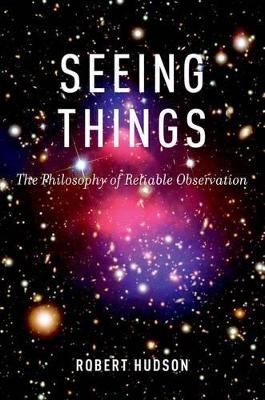
Seeing Things
Oxford University Press Inc (Verlag)
978-0-19-930328-1 (ISBN)
In Seeing Things, Robert Hudson assesses a common way of arguing about observation reports called "robustness reasoning." Robustness reasoning claims that an observation report is more likely to be true if the report is produced by multiple, independent sources. Seeing Things argues that robustness reasoning lacks the special value it is often claimed to have. Hudson exposes key flaws in various popular philosophical defenses of robustness reasoning. This philosophical critique of robustness is extended by recounting five episodes in the history of science (from experimental microbiology, atomic theory, astrophysics and astronomy) where robustness reasoning is -- or could be claimed to have been -- used. Hudson goes on to show that none of these episodes do in fact exhibit robustness reasoning. In this way, the significance of robustness reasoning is rebutted on both philosophical and historical grounds.
But the book does more than critique robustness reasoning. It also develops a better defense of the informative value of observation reports. The book concludes by relating insights into the failure of robustness reasoning to a popular approach to scientific realism called "(theoretical) preservationism." Hudson argues that those who defend this approach to realism commit similar errors to those who advocate robustness reasoning. In turn, a new form of realism is formulated and defended. Called "methodological preservationism," it recognizes the fundamental value of naked eye observation to scientists -- and the rest of us.
Robert Hudson received his Ph.D. in the Philosophy of Science from the University of Western Ontario in 1992. He has taught at a number of universities throughout North America, and has been at the University of Saskatchewan since 2001. He works mainly in the areas of epistemology and the history and philosophy of science.
Preface ; Introduction ; Chapter 1: For and Against Robustness ; The 'No-Miracle' Argument for Robustness ; Probabilistic Approaches to Robustness ; Pragmatic Approaches to Robustness ; Epistemic Independence Approaches to Robustness ; Summary ; Chapter 2: The Mesosome: a Case of Mistaken Observation ; Introducing the Mesosome: Rasmussen and Culp ; The Mesosome Experiments ; Reliable Process Reasoning ; Rasmussen's Indeterminism ; Chapter 3: The WIMP: the Value of Model-Independence ; Dark Matter and WIMPs ; DAMA's Model-Independent Approach ; Model-Dependent Approaches ; An Historical Argument Against Robustness ; Reliable Process Reasoning ; Chapter 4: Perrin's Atoms and Molecules ; Perrin's Table ; The Viscosity of Gases ; Brownian Movement: Vertical Distributions in Emulsions ; Brownian Movement: Displacement, Rotation and Diffusion of Brownian Particles Taking Stock ; Perrin's Realism about Molecules ; Chapter 5: Dark Matter and Dark Energy ; Dark Matter and the Bullet Cluster ; Type Ia Supernovae and Dark Energy ; Defeating Systematic Errors: the Smoking Gun ; Robustness in the Dark Energy Case? ; Chapter 6: Final Considerations Against Robustness ; Independence and the Core Argument ; The Need for Independence Does Not Equal the Need for Robustness The Converse to Robustness is Normally Resisted ; The Corroborating Witness: Not a Case of Robustness ; No Robustness Found in Mathematics and Logic ; Robustness Fails to Ground Representational Accuracy ; The Sociological Dimension of Robustness ; Chapter 7: Robustness and Scientific Realism ; The No-Miracle Argument for Scientific Realism ; In Support of Theoretical Preservationism ; Objections to Theoretical Preservationism ; Realism, the Pessimistic Induction and Preservationism ; The Improved Standards Response: 'Methodological Preservationism' ; Conclusion ; Appendix 1 ; Appendix 2 ; Appendix 3 ; Appendix 4 ; Bibliography ; Index
| Verlagsort | New York |
|---|---|
| Sprache | englisch |
| Maße | 211 x 150 mm |
| Gewicht | 476 g |
| Themenwelt | Geisteswissenschaften ► Philosophie ► Erkenntnistheorie / Wissenschaftstheorie |
| Geisteswissenschaften ► Philosophie ► Logik | |
| Naturwissenschaften | |
| ISBN-10 | 0-19-930328-2 / 0199303282 |
| ISBN-13 | 978-0-19-930328-1 / 9780199303281 |
| Zustand | Neuware |
| Haben Sie eine Frage zum Produkt? |
aus dem Bereich


![Was heißt Denken?. Vorlesung Wintersemester 1951/52. [Was bedeutet das alles?] - Martin Heidegger](/media/113619842)